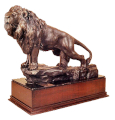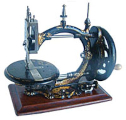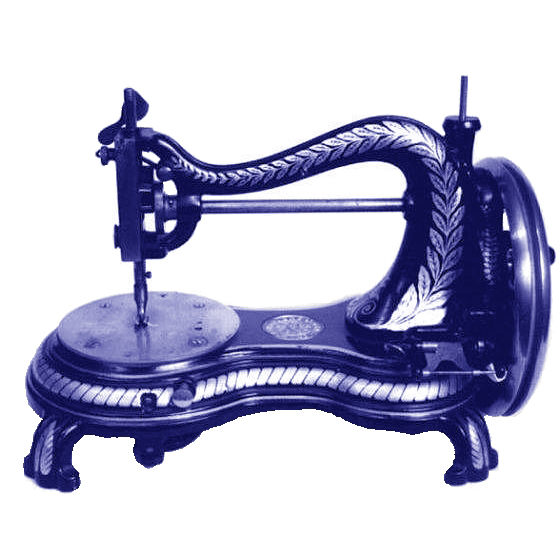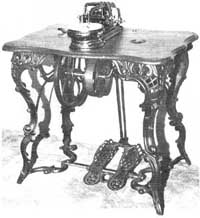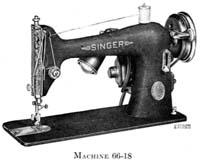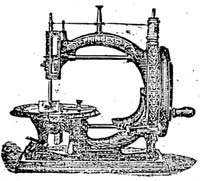Our Grover & baker
The New York Times, April 25, 1864, featured Grover and Baker's ebonized cabinet model. Apparently, their effusive correspondent liked it…
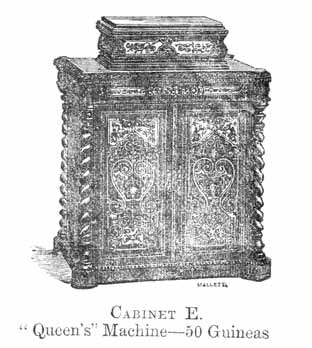
the ebonized cabinet model described in the text, from an instruction book (1860)
We have a Grover and Baker up at our house. It is a wonderful machine, difficult to comprehend – less a man had taste for the finer mechanics – and strange in its motions from its very irregularity.
It stands in our front chamber, in the northeast corner, between two windows. The earliest beams of the morning gild the black walnut casket which encloses it and the red shadows of the sunset linger among its steel axles and cunning contrivances.
It stands where all its clock-work and ever curious spring are open to the daylight and yet, we have studied it long without being able to understand more than these two facts: that it does our family sewing and saves us much in our household economy. And this machine, which seems so strange to us, may be plain and simple to a man who deals with steam-engines. We only see that here is a wheel and there is a pulley, and here again are things that go up and down, and shoot across, and bob around generally, and there again, is a shirt, or pillow-case, or whatnot, skilfully compacted and put together in every seam and gusset, and deftly made as by fingers expert in needle-work.
Pleasant to the eye is our Grover and Baker. Its surroundings are of black walnut - gorgeous wood; served in handsome, devices – with grooves and panels, and an ornamented cover like the topmost story of a bureau. Its curves and motions are full of grace, bending and swaying in the line of beauty. Gently turns the great wheel, beating in its revolutions like a stout heart - rousing up the smaller members - the springs and the pinions, the cams and the ratchets - and sending its strong impulse like the leap of the blood in the veins, up into the polished steel-arm, which seems to grow ruddy with the instinct of life, blushing in its work even as the arm of an industrious handmaiden.
Pleasant to the ear is our Grover and Baker. We hear its musical hum at noon as we draw near our peaceful threshold, and we think of the hum of bees and the singing of birds, and all the sounds of voluptuous summer. Let the Winter frown, and the east wind blow; a warm breeze from the South floats into our dream – there is a gurgling brook in the gutter – a smell of pine trees comes from the garden over the way – in our parlour window a royal hyacinth is waving its purple plume - in the sky are white clouds and whistling bobolinks, and everywhere it is June in its prime and beauty. Magical Grover and Baker, singing madrigals that change the seasons in the twinkling of an eye, transforming icicles into blossoms - filling the air with odours, pencilling the gray shadow with fresh sunshine, and softening the howl of the gale to the whisper of a zephyr.
Pleasant to the mind is our Grover and Baker. It suggests contemplations and economical calculations, which are a delight to the head of a family, and its statistics combining the achievements of mind over matter, and of steel wires over mortal sinews, are full of that saving health so nearly related to that virtue which once from funeral meats did furnish forth the marriage tables of royal Gertrude, "thrift, thrift, Horatio!"
And what more shall we say of our Grover and Baker - ornament of the dwelling, sweet singer in the hours of labor, the housewife's solace, brilliant achievement of mechanical genius, wonder of human art? It sews and stitches; it quilts and tucks; it fells and binds; it runs up the regular seam and slopes down the eccentric gusset, and performs all those mystical evolutions which once belonged to traditionary Mary Annes – shadowy seamstress of the past. And yet the story is but part told.
That delicate needle, controlled by curious mechanism, is an artist's pencil, working in lights and shades with various cunning. Beneath the magic of its touch, the soberest fabric is changed to broidered tissues; the slipper blooms into roses and polyanthuses; waistcoats turn to flowering vines and the maiden's kerchief - sheer and shadowy - becomes, like Othello's fatal gift to Desdemona, a charmed web of unimagined beauty.
To speak plainly, our Grover and Baker embroiders as well as sews, giving something to beauty as well as to use and combines with the practical facts of economy the aesthetics of higher grace.
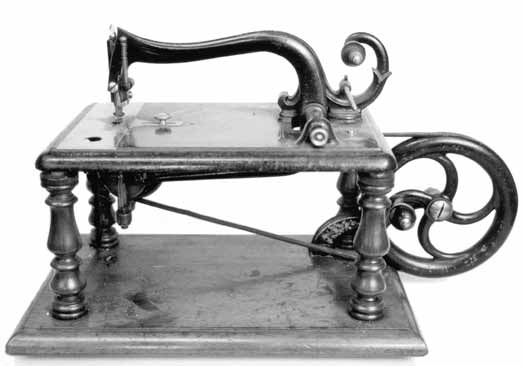
Reader, are you the head of a family? You may, if you please, possess yourself of one of these magical machines. When we purchased our Grover and Baker, we bought no exclusive right. It is vended in the City at a busy depositary near by that broad avenue known by the name of Dorrance. It is sold as merchandise in the market, and you may buy it with paper money, and use it, and contemplate it, as we have done, drawing morals from it and philosophical reflections. You may bestow it as a token of affection on wife or daughter; or if you are an unmarried man, on some fair friend, who, like Byron's Maid of Athens, insists upon your heart; and the gift will be one of pleasant memories.
We will not say, in hackneyed phrase, no family should be without it, for it sounds mercenary; but we may certify and aver, from an experience now three months old, that it enters the domestic precincts as an angel of peace, diffusing over piano, and hearth rug, and the noon-day table, an atmosphere most comfortable and balmy. It scatters by its presence those shadows of multiplying labors which at times settle down over the best regulated households. Clouds of unfinished garments, both inner and outer, and spectral mists of unsewed calico and muslin dissolve before it into satisfactory rainbows and golden glimpses of ease and, like Prospero's insubstantial visions, "… leave not a rack behind."
There are no vapors about our Grover & Baker. Serene, yet earnest in purpose, it goes into the battle of life clad in an armour of iron and steel. It grapples with the stern necessities and stout facts of every day. It topples over old monuments of hard work. It cheers up fainting hearts like a tonic, and invigorates weary arms like an elixir.
It deals with a flannel shirt as a trifle, and with a hooped farthingale as a matter of small moment; it is full of sweet and swift surprises and will, if need be, "… put a girdle round about the earth in forty minutes". (JL)
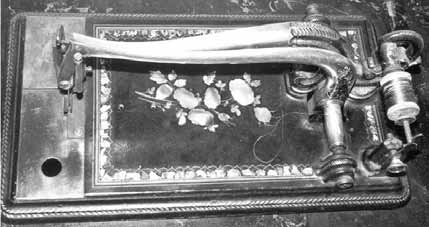
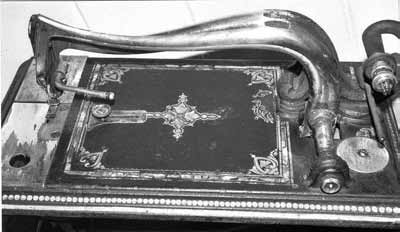
G&B heads of 1861, note mother-of-pearl and silver plating
